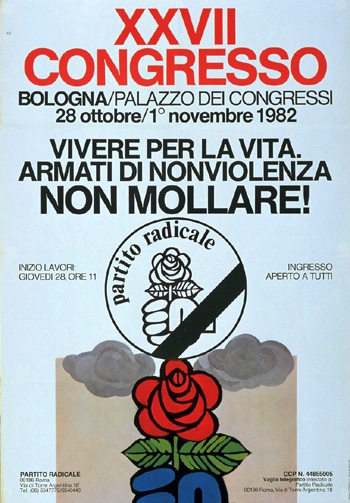|
|

During 1982 the fight against death by starvation throughout the world takes on substance, new tools are formed, new members join up. The motion of the Bologna Congress, a congress marked by deep inner stresses, confirms the priority of this political battle. Beside this element, the motion contains an analysis of the regime, a first attempt to penetrate deeply into the political situation determined after the end of national unity, declaring the crisis of the regime and the gravity of the anti-constitutional complications. The Congress also approves a financial regulation that codifies in a somewhat "definitive" way the uses to be made of public financing. The Congress confirms Marco Pannella as Secretary and Marcello Crivellini as Treasurer.
The XXVIIth Congress of the Radical Party declares to the country that there is a real crisis, not only economic and financial, but by now political and social as well. It is a crisis of the regime that threatens to overwhelm society and the country. Those who have created and are responsible for it seem constantly less able to control it except by resorting to violent anti-con- stitutional and anti-institutional measures and those against all expression of opinion and political action that will not bow to the logic of the regime - hence, first of all, against the Radical Party and its policies, against honest and correct information, against all resistance and obstacles.It is an all the more dangerous form of violence in that it arises from fear, weakness and impotence, and it must bowl over and violate the very rules and the very sources that legitimise power. It is an all the more dangerous kind of violence because it welds itself to hidden power and that of organised crime which it begins by tolerating, then nourishes, and which is in any case homogeneous. The physical elimination of General Dalla Chiesa (while conducting anti-Mafia investigations in Sicily, ed.) is not only the most recent episode, but also the most dramatic and emblematic. For a long time now the talk about the "great Constitutional reform" revealed the need to adapt republican legality to the material holding of power and the practices for dividing it so as to provoke its institutional legitimisation. The precipitation of the economic and financial crisis, the uncontrollability of the mechanisms of public spending and the size of the public debt that touches the borders of bankruptcy, make these attempts and these designs all the more necessary as they are unpredictable in their outcome. This policy has made Italy's condition more dramatic in an international crisis that has been primarily determined by the egoistic and oppressive closure of the industrialised world against the Third and Fourth Worlds with the result of extermination, disorders, re-armament and war. In the course of only three years, under the guidance of a Socialist minister, Italy has passed within the Western world from a passive to an active subject of this process with a growing drain on internal resources on behalf of militarist and rearmament policies. The violent consummation of this regime crisis cannot be confined to within the "Palazzo" (a symbol of the political power-holders, and their activities in a negative sense, ed.). The country must be given new elections with a choice of clear alternative proposals regarding institutions, economic and international options. On this occasion the Radical Party will present itself offering counterproposals to the mad choices of the regime: - the defence and the implementation of the Constitution, with proposals and projects that will break the mechanisms by which the institutions are emptied of meaning and divided up among the parties; to begin with there should be a popular petition for the creation of an investigating commission on the financing of the parties, their budgets and the state of their finances; - an all-inclusive project for the conversion of the armaments budget (76,000 billion lire in '86 for new weapons systems) into the financing of projects for life and to improve the quality of life. The XXVIIth Congress of the Radical Party reiterates the party's priority commitment, nationally and internationally, to the fight against death by starvation and gives a mandate to the party's statutory organs and all Radicals to relaunch the mayors' bill with its objectives and methods for saving three million lives. In that sense the Congress gives the statutory organs of the party a mandate to promote and co-ordinate a vast action capable of involving the whole range of institutional, political, social, and religious groups which in their complexity can and must be partners in this dialogue. The enormous political heritage that has accumulated in these three years of battle against the holocaust and in favour of survival will allow any Radical today - whether he works in Italy or abroad - to have a terrain of his own for actions leading civil society to gain a great and decisive momentum capable of breaking up the politics of extermination and convert it into a politics of life. The Added Amendment to the Motion The XXVIIth Congress denounces the disinformation furnished by the RAI (Italian radio and TV, ed.) on the real and political problems of the society; denounces the expulsion from the mass news media of the true victims of the decay of the regime, from the members of the third age dying of hunger, to the handicapped, to the unemployed, to all those who have no spokesman. Therefore the XXVII Congress gives the party executive organs a mandate to support the campaign for non-payment of the subscription to the RAI in 1983. THE FINANCIAL REGULATION 1) By its statutory norms confirmed again by the XXVIth Congress, the Radical Party is strictly self-financed. Therefore public financing cannot be used in any case for payment of expenses pertaining to the party's structures and activities (statute, 1.2 and the specific motion approved by the XXVIth Ordinary Congress). 2) Each year the Treasurer will present separate budgets for the two distinct administrations: a) The party's own funds, coming from the financing sources indicated in point 1.2 of the statute and possible reimbursements for election expenses; b) Funds coming from public financing; During the transitional period, a third administration is established for the levelling of debts deriving from the administration prior to November 1, 1981, which will be paid with funds coming from integrating quotas of public financing that were the competence of previous financial years, as foreseen in the specific motion passed by the XXVIth Ordinary Congress of the Radical Party. 3) As with the budgets, bank and postal accounts will be kept strictly separate as will the disposable cash of the two different administrations as in point 2. The book-keeping and the necessary documentation are to be entrusted to a professional outside service that offers the necessary guarantees of technical capability. 4) Beginning with the 1983 financial year, all subjects outside the party that receive financing from the Radical Party's separate public financing fund are obliged to present the Congress with a report on the progress of the current financial year (the current solar year) with reference to projects, programs, or in any case to those foreseen which have determined their receipt of public financing funds from the Treasurer. The subjects outside the party will also be sure to make known to the Congress any changes of objectives or program that they may have made for the subsequent year, as well as submitting to the Treasurer the provisional forecast of their financial needs. 5) The budget - in its two separate parts - must be an accounting prospectus from which emerge the results of the administration and the financial status. 6) The Treasurer may assume financial commitments for and in the name of the Party whenever that may be necessary for pursuing political activities and even when such commitments extend beyond the term of his mandate if necessary. He may contract short-term debts with private persons or credit institutions. 7) The time limit implicit in paragraph 6 is valid both for the administration of the party's own funds and that of funds coming from public financing. In the case of this second administration the Treasurer may only use his right to contract debts when required by urgent public necessity (for example, early national elections) that provides for a reimbursement. 8) Without prejudice to the limits of time and quality, the Treasurer must inform the Federative Council of any financial commitment (loan) that has been assumed. 9) Any residues that may result from any administration (Radical Party's own funds or public funds) may be invested by the Treasurer to increase reserves legitimately. The investments will be chosen according to criteria of prudence and guarantees and be part of his charge as Treasurer with a fiduciary mandate without deputation. Therefore investments with a risk element or with a fixed expiration date or otherwise connected to expectations of results over a long term are to be excluded- 10) For the evaluation for projects to finance with public financing funds and the consequent decisions regarding those (outside the Radical Party) who propose them, the Treasurer will make use of a panel of experts to be appointed by himself and whose names will be given to the Federal Council. The panel will make a written report. |
 The
XXVIIth Congress of the Radical Party declares that 1982 has once again
been a year of extermination and not of salvation for human lives because
of the conscious responsibility of the Italian government and notwithstanding
the appeal of Nobel Prize winners, the mayors' bill of law, the vast
mobilisation of human conscience and the extraordinary political successes
that followed upon it.
The
XXVIIth Congress of the Radical Party declares that 1982 has once again
been a year of extermination and not of salvation for human lives because
of the conscious responsibility of the Italian government and notwithstanding
the appeal of Nobel Prize winners, the mayors' bill of law, the vast
mobilisation of human conscience and the extraordinary political successes
that followed upon it.